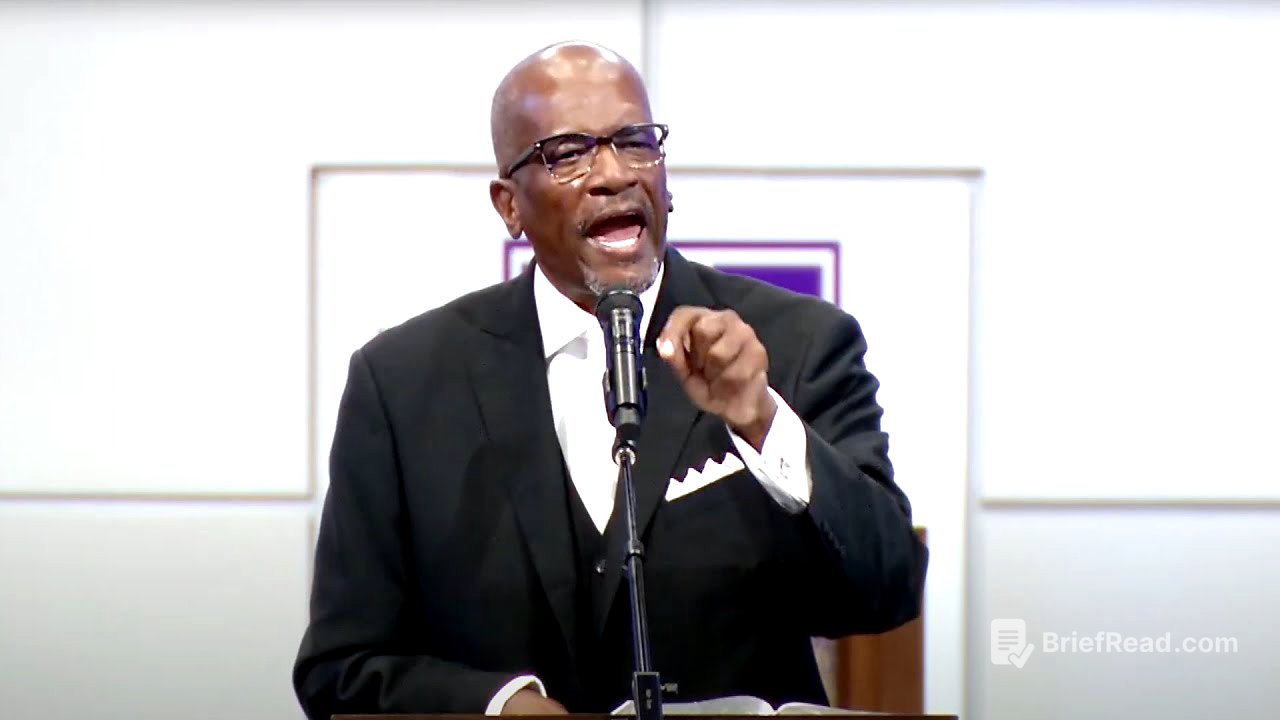TLDR;
The sermon, titled "Holding It Together While Falling Apart," uses the story of the widow in 2 Kings 4:1-7 to illustrate how God knows our problems and releases our potential in times of despair. It emphasizes that God often waits for us to reach the end of our own resources before stepping in to help, and that He uses what we already have to bring about miracles. The sermon encourages listeners to acknowledge their needs, recognize their existing blessings, and actively participate in their own deliverance through faith, humility, and obedience.
- God knows our problems and cares for us.
- God releases our potential when we are at our lowest.
- We must actively participate in our own miracles.
- Desire, obedience, and expectation are key vessels for receiving God's blessings.
Introduction: Holding It Together While Falling Apart [0:00]
The sermon begins with a personal anecdote about the speaker's sister, Gwyn, who suffered from brain aneurysms and felt trapped in the hospital. This story serves as a metaphor for the message: the feeling of being trapped and holding it together while falling apart. The speaker acknowledges that many people experience this feeling in various aspects of life, such as problems with children, broken marriages, difficult jobs, financial struggles, and the death of loved ones. Despite these challenges, the speaker offers good news: God knows our problems and cares for us.
God Knows Our Problems [8:47]
The speaker uses the story of the widow in 2 Kings 4:1-7 to illustrate how God knows our problems. The widow, who was the wife of a member of the company of prophets, was in deep despair because her husband had died, leaving her in debt and her sons about to be taken as slaves. The speaker explains that in those times, there were no social safety nets, and the widow was completely helpless. This situation highlights that God often allows us to reach our extremity so that He can demonstrate His power and grace. The speaker emphasizes that God wants to empty us of ourselves so that He can fill us with Himself, and that true help comes when we admit our brokenness and dependence on Him.
God Releases Our Potential [16:13]
The sermon transitions to how God releases our potential, referencing Elisha's interaction with the widow. Elisha asks her, "What do you have in the house?" and instructs her to borrow empty vessels from her neighbors. This highlights the principle that God often uses what we already have to bring about miracles. The speaker emphasizes the importance of self-help and personal involvement, stating that God helps those who are willing to help themselves. He connects this to parenting, noting that children do not appreciate what they are given without effort. The speaker encourages listeners to stop focusing on what they lack and to be grateful for what they have, as little becomes much when placed in the Master's hand.
Personal, Public, and Private Aspects of Receiving Blessings [27:01]
The speaker explains that receiving blessings involves personal, public, and private aspects. First, it is personal, as the widow had to get the vessels herself, signifying our cooperation in our own miracle. The speaker uses examples from the Bible where individuals had to take action to receive God's blessings. Second, it is public, as the widow had to borrow vessels from her neighbors, indicating that we need to let others know we are struggling. The speaker notes that pride often prevents us from seeking help. Finally, it is private, as Elisha instructed the widow to shut the door and pour the oil with her sons, symbolizing the need for a private prayer life where we communicate with God.
Vessels of Desire, Obedience, and Expectation [36:18]
The sermon concludes by identifying three vessels we need to bring to God: desire, obedience, and expectation. We must desire God more than anything else, obey His word and promises, and expect a miracle. The speaker defines Calvary as God's U-turn, a chance to get back on the right track when we have made mistakes. He encourages listeners to fill their vessels with these three elements, expecting God to work in their lives and provide for their needs. The speaker ends with a powerful declaration that God will take care of us, no matter what we are going through, and encourages the congregation to share this message with one another.









